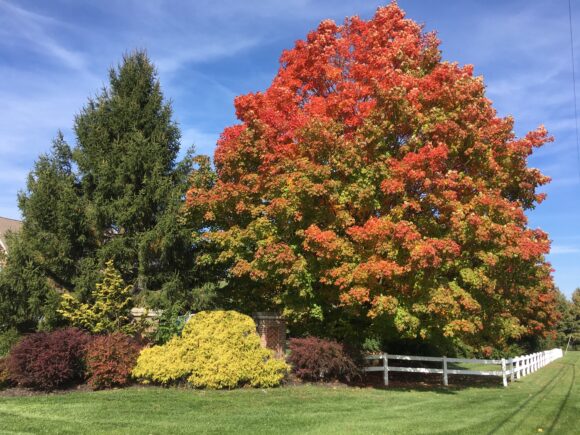
Photo: Joseph Heckman
By Joseph Heckman, extension specialist in the Department of Plant Biology.
Autumn leaves brighten and beautify our communities before falling in abundance as fall advances. About 300,000 tons of shade tree leaves are collected by municipalities across New Jersey every fall season.
In 1988, the state of New Jersey banned the dumping of shade tree leaves in landfills and combustion facilities. Existing landfill capacity is limited, and combustion destroys a valuable resource that can otherwise benefit soils in the Garden State.
Rutgers New Jersey Agricultural Experiment Station (NJAES) was called upon to develop best practices for on-farm uses of shade tree leaves. Over the last 35 years, many field and greenhouse studies have been conducted by Rutgers Cooperative Extension horticulturalists, agronomists and soil scientists in an effort to understand the chemical composition of shade tree leaves, their effect on soil properties and potential uses as an agricultural resource. A review and summary of the research findings were recently published in HortTechnology.
Numerous ways were found to use community collected shade tree leaves as a beneficial resource on local farms. Leaves used as a mulch on the soil surface in orchards and mulching of vine crops provide excellent weed control without herbicides, help to conserve soil moisture, prevent soil splash onto fruit, and protect against soil erosion.
The chemistry of shade tree leaves suggests they have the potential to cause a nitrogen deficiency in crops in the first year of use, but this problem can be avoided by good crop rotation and timely application of fertilizer. In the second and third year of use, the organic residues from leaves supply valuable amounts of essential plant nutrients for crop production. In most years, plant growth and crops yields were enhanced with use of shade tree leaves. The years of field research helped to correct the myth that land application of shade tree leaves would cause soils to become acid. Instead, soil test data exhibited a slight upward trend in pH following repeated annual applications.
Besides keeping this organic material out of landfills, use in agricultural helps build community relationships between urban centers and farmers. In the process, nutrients are recycled to restore fertility and soil organic matter content and soil health is enhanced.
It is important to note that farmers accepting this material for use as a soil amendment want nothing in the bag except shade tree leaves. Thus, landscape workers and homeowners who rake and collect the leaves have a role in excluding trash, including items like food wrappers, bottles and cans.
Considering these NJAES research findings, responsible land application of collected shade tree leaves should be considered by the New Jersey Department of Environmental Protection when regulating the use of shade tree leaves.

